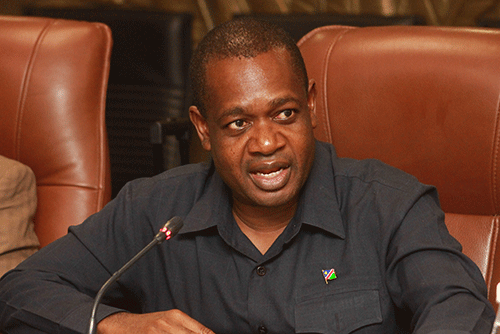Information minister Peya Mushelenga has said the government understands the plight of civil servants, but times are tough and the reduced revenue must be shared among various priorities.
“We understand the plight of civil servants and that, if resources were available and allow, the government as it has done in the past years up to 2017/2018 would have agreed to all the demands from the unions,” Mushelenga said this week in the National Assembly.
“However, times have changed and become harder, resulting in huge reduced revenue at the disposal of the government to be shared between civil servants and the rest of society. Many will recall that when the economy was doing well and resources were available, the government granted increases in most cases above the rate of inflation.”
Mushelenga said this while updating parliamentarians on the status of negotiations about salaries and other benefits for civil servants for the 2021/2022 financial year, held between government and their recognised trade unions.
Workers unions representing the interests of civil servants had requested for a 10% increment across the board, a 25% increase to qualifying amounts on housing subsidies, a 9% increase on housing allowances, a 10% increase in transport for civil servants below management, and a N$7 per kilometre tariff increase.
Despite efforts by the unions to revise their initial proposals for a basic salary increase from 10% to 5%, the government still didn’t consider it.
The only partial benefit government is willing to make an offer on is the housing allowance, where management and staff members below management cadre level would get a 4.5% increase.
The other benefit the government is also willing to offer is another 4.5% for the housing ownership scheme, and a 10% transport allowance increase for staff members below management level.
Meanwhile, public sector unions have described government’s zero offer on salary increments as immoral, insensitive and an act without due regard for the plight of civil servants. This is considering that government did not grant any salary increments to them for five consecutive financial years.
Mushelenga said civil servants are aware that the country has been facing and continues to face various challenges, notably stagnant economic growth and a consequent reduced fiscal space since 2016, which resulted from a combination of weak global demand, and low commodity prices and protracted droughts.
“Government is forced to finance the gap between the high committed expenditure levels and the reduced revenue base by increasing borrowing, which has, in turn, increased the level of public debt,” Mushelenga stressed.
He said the public debt currently stands at 75% of GDP, which is extremely high and unsustainable.
“Faced with reduced revenue on one hand and high committed expenditure and further new expenditure demands, on the other hand, the government can only sustain existing expenditure levels. Any measure to commit to new expenditures can only be attained by either increasing taxes, borrowing more, or cutting expenditures in some areas,” he explained.
The politician said even in the face of the hardships, government committed itself to neither retrench nor cut the salaries of government employees, as seen in the private sector.
“Government remains firm in this commitment,” he noted.
Mushelenga said, without doubt, that the increases in expenditure on salaries and benefits of civil servants as demanded by the unions entail a huge additional expenditure, for which additional revenues need to be raised.
“Given that retrenchment is not an option and also given the slow economic recovery, the only other options available are to reduce expenditure on other sectors and/or to borrow,” he reiterated.
“The borrowing window has become narrower, given the high public debt level. The recent downgrading of the country’s credit rating by international rating agencies poses a risk and a further challenge for accessing external borrowing and where such is possible, it is significantly more costly,” he said.
ktjitemisa@nepc.com.na
Caption (Mushelenga)


